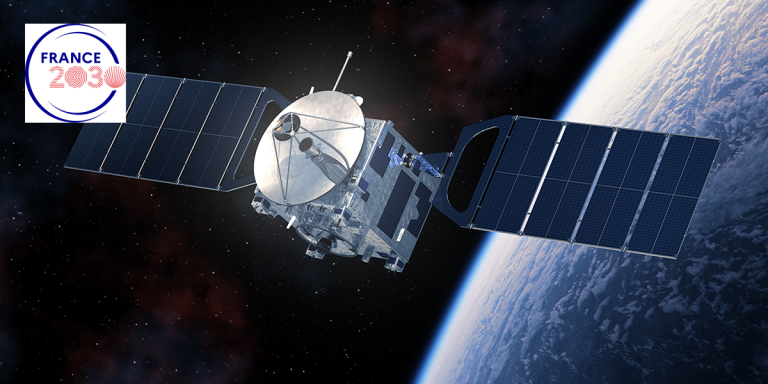Telemetry is used to obtain all data available on a vehicle’s CAN network, remotely and in real time.
Manufacturers make use of all relevant data to improve monitoring throughout a vehicle’s entire life cycle, from design to operations and maintenance.
The power of data and its scope of application is still to be explored, yet one goal is shared by all manufacturers: improving vehicle performance and reliability.
ACTIA is a specialist in vehicle system design and helps manufacturers explore the potential of data. The ACTIA Model Driven Telemetry solution is based on the on-board ACTIA TGU-R unit and the ACTIA D2HUB digital platform.
It is accessible in SaaS (Software As A Service) mode, and used to operate telemetry data simply and securely.
THE ACTIA DATA FACTORY (D2HUB): CUSTOMISED DATA
Selecting the data collected
Whether driven by electricity or fuel, a vehicle has many on-board electronic systems. These communicate via computerised networks that use the standardised CAN (Control Area Network) protocol.
A vehicle generates a large amount of information and data. This valuable data provides information on the condition of the vehicle and its behaviour under real operating conditions.
Some configurable data:
- On-board systems to be monitored,
- Vehicles to be monitored,
- Data to be monitored from a library of FMS data ready to be used or by importing from a private messaging system,
- The most suitable frequency of sampling.
Remote transmission, the role of the gateway
These choices are transmitted remotely to the on-board ACTIA TGU-R unit. It acts as a gateway between the vehicle and the mobile internet.
The TGU-R (Telematics Gateway Unit) is equipped with the latest generation of mobile communication technologies.
It is designed for wireless communication of the data collected from on-board ECUs, via the CAN or the Ethernet. It also manages the position information collected by a new-generation GNSS receiver.
The TGU-R unit is adapted to suit lorry, bus, coach and special vehicle connectivity needs. It is built into original equipment or retrofitted. ACTIA has already produced several million telematics units over the past few years.
Interoperability and open approach
ACTIA’s telemetry expertise is based on the Group’s long-standing knowledge of on-board electronic system design. This established know-how guarantees a holistic system approach to vehicle design.
Since 2018, ACTIA’s range of equipment, hardware modules and applications have been issued with the ITXPT standard. This fully open approach guarantees interoperability for on-board systems and reduced costs for vehicle development. Thanks to the ITXPT label, the TGU-R gateway acquires all information generated by any ITXPT on-board system: whether or not it is designed by ACTIA.
Once collected within the D2HUB Data Factory, this data can be published via APIs open to all data analytics and data processing applications.
In particular, these applications are intended for predictive diagnostics. They can generate visual indicators for monitoring vehicles, in the form of a dashboard.
GUARANTEEING DATA SECURITY
ACTIA makes the security of data and IT systems a priority. The Group actively takes part in work on regulations and standards for automotive cyber security.
The aim is to incorporate the requirements set out in these texts in the company’s processes and products as they are developed.
ACTIA assists project teams and customers in order to consider all aspects of cyber security. For example, the TGU-R telematics unit is delivered with its cyber security manual. This enables manufacturers to develop their applications completely autonomously.
ACTIA has been ISO 27001 certified since 2019: information security management systems to create electronic products and software.
MANAGING BATTERY WARRANTY CONDITIONS
For electrical buses, battery cost is extremely critical. It alone can amount to 50% of the total value of the vehicle.
Monitoring the condition of the battery and ensuring it is operational for the whole vehicle service life is a real challenge for manufacturers. It is therefore very important for batteries to be under manufacturer warranty.
Controlling the battery, particularly the SoC (State of Charge) and SoH (State of Health) makes it possible to detect deviations with the guaranteed autonomy.
Manufacturers and operators monitor the condition of the buses and receive warnings if the limits are exceeded.
This relevant information creates a high level of transparency between both partners. The manufacturer is reassured about the level of warranty they can offer customers.
For fuel-powered and hybrid vehicle buses, telemetry is also used to remotely monitor all critical components of the vehicle. We are able to predict serious faults that may result in immobilisation (doors, engine, etc.).
TELEMETRY IS A REAL PREDICTIVE DIAGNOSTICS TOOL FOR VEHICLES
For over 30 years, ACTIA has been one of the global leaders in diagnostic solutions. These include both on-board and off-board solutions.
However, they may also be intended for:
- vehicle production plants,
- after-sales garage networks or all types of maintenance and repair service providers.
Vehicles are subject to many different types of fault. These faults, for public transport vehicle manufacturers, can affect door opening or correct engine cooling, for example.
With telemetry, there is no longer a need to bring the vehicle back to the garage. Telemetry is a really useful way to perform predictive diagnostics by planning ahead for the occurrence of faults via a processing and analysis system for the data collected (artificial intelligence, deep learning, etc.).
This data may vary significantly:
- Data linked to engine operation to prevent any overheating,
- Data linked to vehicle door operation,
- Fault codes generated by an on-board system, etc.
This predictive diagnostics approach therefore enables the manufacturers to reduce the operating and maintenance costs of their vehicles. It is also used to take corrective action related to vehicle design and optimise pre-series vehicle qualification phases prior to the commercial launch of the final version.
This comprehensive, totally unique expertise guarantees reliability for the vehicle throughout its life cycle. In addition, ACTIA is a major player in terms of regulating diagnostic standards and protocols.
The Group works internationally in various standardisation organisations.
Predictive intelligence, component and battery service life, automated maintenance, anomaly and fault detection, R&D information and so on… the scope of application is broad and the power of data can be astonishing for anyone able to harness it.






